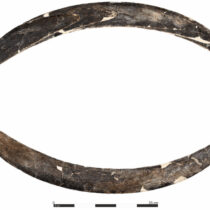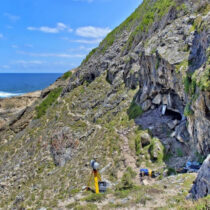52,000-year-old Neanderthal human remains have been unearthed in the Coves del Toll de Moià, in the municipalities of Moià and Tona, in the province of Barcelona, Spain. The remains were discovered during the archaeological excavation work carried out by IPHES-CERCA. Fragments from the skull and a collarbone to a Neanderthal juvenile. Since 2016, remains of four individuals have been found at the site. Researchers also identified cut marks on the surface of some of these bones, a fact that has been interpreted as the result of activities related to cannibalism.
The presentation of the findings was made by the head of the Department of Culture’s Archaeological and Paleontological Heritage Service, Maria Teresa Miró, the mayor of Moià, Dionís Guiteras and the director of IPHES-CERCA, Robert Sala Ramos.
This is not the first documented case of cannibalism among Neanderthals, but it is the first identified in Southern Catalonia. Although anthropophagy does not seem to have been a common phenomenon among these early humans, there are some sites in Europe that suggest similar practices.





